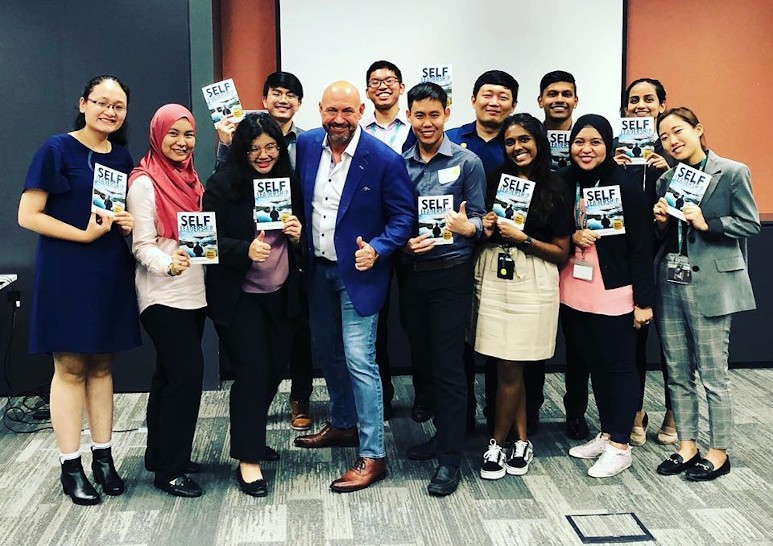Presentation Skills – Training Tips to Improve Impact
Feb 18, 2020
Whether I’m working with graduate trainees or managing directors, there is always a realization of the need to improve their presentation skills. Why are presentation skills such an important skill to accelerate your career or secure your position as a leader?
Well, I’m sure you have sat through many mind-numbing, ‘death by PowerPoint’ presentations, but have you also experienced listening to an engaging storyteller, who has you on the edge of your seat and inspires you with new insights?
Being an engaging storyteller gives you visibility, credibility, and influence. These 3-factors are essential to your career Success.
Learning Presentation Skills
The ability to present or speak well is within everyone’s grasp. With over 20 years of experience as a Motivational Speaker, I have coached the most boring of CEOs and the timidest individual contributor to speak and present with impact.
Regardless of your current position or skill level, to become effective at presenting, you must feel comfortable with yourself. Presenting is the #1 fear or phobia because people imagine the embarrassment of failing in front of an audience.
Using self-leadership, I encourage my students and clients to re-frame their fears as follows:
- Presentations aren’t about perfection they are about connection
- Confidence comes first, and competence comes second
- Your audience won’t be comfortable until you are comfortable with yourself
Once you have addressed your fear, you need to be clear on why developing effective presentation skills is important to you. For example:
- Improve your career prospects
- Gain respect
- Be more influential
- Become a leader
- Be the best version of you
Having a strong, “Why” makes training your presentation skills, much more focused. If you are interested in taking your skills all the way, I have another blog on ‘How to be a Great Keynote Speaker’.
Presentation Skill Tip #1 - “NO Engagement NO Interest.”
The easiest way to create engagement is to create involvement. Your audience is not a passive receptor of your message; they are a dynamic part of it. Right at the beginning of your presentation, pose a question or tell a story that takes them to a time, place, and emotion.
An opening question should ‘pace’ the audience’s current reality. If I am presenting to a group that has been told, “You HAVE to be there” I might ask “What would you rather be doing rather than be at this presentation?”, If you are giving a financial presentation, you might ask, “What’s the most important number we should be focusing on?”.
Only once you have engagement do you introduce the topic and your credibility to talk about it.
Presentation Skill Tip #2 - “The Vessel of Confidence.”
I am sure that you have seen competent people present without confidence and confident people who lack competence (nothing is as dangerous as a confident fool!).
When coaching people to feel confident in presenting, I use a technique that I call, “The Vessel of Confidence”. This involves finding your physiology of confidence, and ‘anchoring’ this so that you can trigger it at will. Once you have a vessel of confidence, you can access your competence and add content to your presentation.
The biggest mistake people make in preparing for a presentation is only thinking about the content and forgetting to practice that content from the physiology of confidence.
If you must present, learn everything you can about the subject and Prepare, Prepare, Prepare. You may only speak about 2% of what you know but your competence will show when you can make the complex simple.
Presentation Skill Tip #3 - “Make it Sticky”
People will only remember one or two or three points from your presentation, so plan your presentation so that those 2-3 points will stick with them. Techniques for making your point stick include:
- Repetition – for anything you want the audience to remember, say it three times
- Gestures and Pauses – use your gestures and verbal pauses to emphasize each key point
- Visuals – we live in a multimedia world so use powerful graphics or short videos to create a visual link to your sticky points
- Humor – if you can make them laugh you light up their brain with feel-good chemicals (endorphins) and increase retention
- KISS – keep it super simple is an acronym and acronyms can be great memory triggers
- Use Models – simple diagrams are very sticky, particularly if combined with an acronym
- Summarize – ensure that your audience knows what is important to remember
Developing presentation skills without the underlying confidence that comes from Executive Presence will not be as effective. This is why I created an on-demand, online coaching program called the Executive Presence Accelerator.
Get a FREE Chapter of The New Leadership Playbook
Stay connected with news and updates!
Join our mailing list to receive the latest news and updates from our team.
Don't worry, your information will not be shared.
We hate SPAM. We will never sell your information, for any reason.


